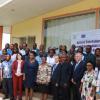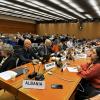News
Displaying Results 51 - 72 of 72
Sierra Leone shares four major rivers with the neighbouring countries of Guinea and Liberia, including the Great Scarcies, Little Scarcies and Moa shared with Guinea, and Mano River shared with Liberia. All provide crucial freshwater that sustains ecosystems, livelihoods and the well-being of…
UNECE has today released a detailed inventory of Thematic and Extended Accounts.
This new resource offers comprehensive insights into the economic accounts published by countries worldwide that expand on the classical measures included in core national accounts.
The System of National…
At the World Economic Forum Annual Meeting in Davos, UNECE Executive Secretary Tatiana Molcean highlighted the role of UNECE’s legal instruments, standards and tools in dealing with the most pressing global challenges, namely climate change, digital and green transformations, low-carbon energy…
Burkina Faso is one of the Sahelian countries hardest hit by the effects of climate change, experiencing torrential rains and floods, as well as periods of insufficient rainfall.
To help address these challenges, through adaptation, resilience and concerted, shared management of its water…
In recent years, the participating States of the United Nations Special Programme for the Economies of Central Asia (SPECA) - Afghanistan, Azerbaijan, Kazakhstan, Kyrgyzstan, Tajikistan, Turkmenistan, and Uzbekistan - have observed rapid growth in the number and impact of business incubators and…
The Government of Ukraine is committed to rebuilding its infrastructure with a focus on achieving the Sustainable Development Goals (SDGs) and pursuing a resilient, inclusive and sustainable recovery.
However, the reconstruction and recovery needs of Ukraine are enormous and were estimated by…
Originally introduced in policy and development discussions in 2011, the water-food-energy-ecosystem nexus approach has evolved into a pivotal framework for sustainable development and achieving the Sustainable Development Goals (SDGs).
Work on the water-energy-food-ecosystems nexus under the…
Infrastructure is crucial for social and economic development. To achieve the 2030 Agenda for Sustainable Development, infrastructure needs to be green, climate resilient, circular, inclusive and fiscally sustainable, with people as the main beneficiaries. Infrastructure is also needed to rebuild…
Trade facilitation is a potent instrument that can multiply the benefits of trade. Beyond direct impact on economic growth through higher trade flows linked to improved efficiency at the borders, trade facilitation reforms can also contribute to other policy goals. For example, through the…
Cooperation and management of transboundary waters, which span over 45% of the world's surface and serve as vital resources for nearly half of the global population, face the imminent threat of underfunding. The last reporting exercise on Sustainable Development Goals (SDG) indicator 6.5.2 (2020),…
According to a recently published UNECE Policy Paper, the agrifood, the garment and footwear and the mineral sectors contribute significantly to the economic growth and employment in the UNECE region, while being major sources of global greenhouse gases (GHG) and environmental pollution. Evidence…
As the international community marks 75 years since the adoption of the groundbreaking Universal Declaration of Human Rights, UNECE calls for commitment and practical measures from governments and all stakeholders in the region to uphold the human rights of all persons including those with…
The Protocol on Pollutant Release and Transfer Registers (Protocol on PRTRs) sets international standards for reporting on pollutant releases from a range of economic activities, such as mineral industry operations, plastic production, waste and wastewater management or the rearing of poultry or…
Transparency in the environmental performance of economic activities and effective public access to environmental information, especially on products, are indispensable in addressing pressing environmental challenges. This also supports a just transition towards a green and circular economy,…
The Mediterranean Region, home to over 510 million people, is an important crossroads for economic, social and cultural exchanges between Europe, Africa, Asia and other continents. The region is rich in biodiversity, but has come under pressure due to the intensive exploitation of mineral resources…
In a rapidly evolving world, grappling with climate change and the triple planetary crisis, transformative innovation stands as a crucial solution to these pressing challenges. Strategic learning is increasingly recognized as a key component in both ecosystem development and the broader realm of…
UNECE and partners are working together to support North Macedonia in its green energy transition by building capacities to finance energy efficiency (EE) and renewable energy (RE) projects.
To this end, UNECE and UNDP organized two training sessions on design and verification of energy…
Risk is a part of our everyday lives. When we wear a helmet to ride a bike, for example, we accept a small inconvenience to reduce the risk of a fall or an accident. When a homeowner decides to retrofit their house, they incur a cost to shield against an earthquake or a flood. Faced with the COVID…
The UNECE region, in particular Europe and North America, has become the epicenter of the COVID-19 pandemic. In addition to the devastating impact on lives and health, countries in the region are suffering heavy socio-economic consequences. The Gross Domestic Product (GDP) is projected to fall…
On 8 March, we celebrate International Women’s Day with this year’s theme “I am Generation Equality: Realizing Women’s Rights”. We still have a long way to go. In October 2019, UNECE hosted a regional meeting to review the progress and discuss the challenges in the implementation of the most…
Every year we lose about 14% of the food produced before it is sold, and this does not even include the food never harvested. Even more is wasted at retail and consumer levels. At the same time, over 800 million people worldwide suffer from hunger, while food loss is a major contributor to CO2…
The world is urbanizing fast. Already today, half the population is living in cities. By 2050, that proportion is projected to rise to over two thirds. Cities are economic powerhouses, accounting for 80 percent of world GDP. They also have large ecological footprints, accounting for 60-80 percent…

















